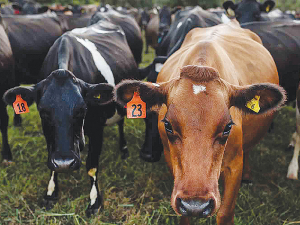Editorial: Happy days
OPINION: The year has started positively for New Zealand dairy farmers and things are likely to get better.
 Much of the proposed code does not align with MPI's own guidelines for drafting codes of animal welfare, including plain language requirements, claims Federated Farmers.
Much of the proposed code does not align with MPI's own guidelines for drafting codes of animal welfare, including plain language requirements, claims Federated Farmers.
A proposed Dairy Cattle Code of Welfare is highly prescriptive and dictates what a farmer must do, rather than having an outcome that will need to be met, says Federated Farmers.
"We are concerned that the proposed code will harm the viability of farming, will have severe economic costs, and will probably not improve animal welfare outcomes," the Feds say in a submission to MPI's National Animal Welfare Advisory Committee (NAWAC).
It fears the proposed minimum standards will do nothing to improve animal welfare but may "criminalise farmers" by having standards that cannot be met and indicators that are open to interpretation.
The code as proposed is overly long and confusing in its structure; it will be difficult for farmers to convert it into practical action and processes on farm, the Feds say.
The Feds are "concerned that many of the proposed changes to minimum standards are being argued as necessary for market access".
"We consider that a Code of Welfare is not the place to address market access issues. There is little evidence to suggest that changes to the Code will materially improve the saleability of our primary produce as the current minimum standards and best practice outstrips animal welfare standards in most of the market we supply.
"Farmers are under increasing pressure to meet higher standards of compliance (i.e. reviews/formal training/quality assurance). This regulatory burden ironically means that they have less time with their animals and staff which in turn can lead to poorer outcomes for their stock.
"The prescriptive inputs focus of the proposed code also has the potential to stifle innovation by forcing farmers into a tick box situation where they are concentrating on the required inputs rather than finding the best way to achieve the desired outcomes."
Much of the proposed code does not align with MPI's own guidelines for drafting codes of animal welfare, including plain language requirements,.
The Feds say many example indicators are quasi standards and should be included only as best practice, if at all. Many of the Recommended Best go well a bove what even leading farmers are doing. The inclusion of many more example Indicators and the expansion of the Recommended Best Practice sections has made the Code overly long.
"Much of the material in these sections would be better suited for a companion guide to recommended best practice where there would be sufficient room to expand on the science attracted to the recommendations."
The Code will increase from 63 to 85 pages, have 15 new/amended regulations, 100 new points on minimum standards, 100 new points on recommended best practice, and 250 new example indicators. Because of its size, many operators may not engage with it.
The Feds question whether the Code of Welfare is the right vehicle for much of this material, saying an alternative would be a manual of best practice, which could be the basis of an education campaign.
Many of the 'indicators' are behaviours and are not measurable.
"Many of these indicators are written in a way that would lead people to assume that farmers are not already doing these things and need it spelt out."
The World Wide Sires National All Day Breeds Best Youth Camp Best All Rounder plaudit has become family affair, with 2026 Paramount Cup winner Holly Williams following in her sister Zara's footsteps.
DairyNZ is giving New Zealand farmers a unique opportunity to gain hands-on governance and leadership experience within the dairy sector.
Herd improvement company LIC has posted a 5.2% lift in half-year revenue, thanks to increasing demand for genetics.
According to the latest Fresh Produce Trend Report from United Fresh, 2026 will be a year where fruit and vegetables are shaped by cost pressures, rapid digital adoption, and a renewed focus on wellbeing at home.
The Roar is a highlight of the game hunting calendar in New Zealand, with thousands of hunters set to head for the hills to hunt male stags during March and April.
OPINION: The past few weeks have been tough on farms across the North Island: floods and storms have caused damage and disruption to families and businesses.
OPINION: Fonterra may be on the verge of selling its consumer business in New Zealand, but the co-operative is not…
OPINION: What does the birth rate in China have to do with stock trading? Just ask a2 Milk Company.